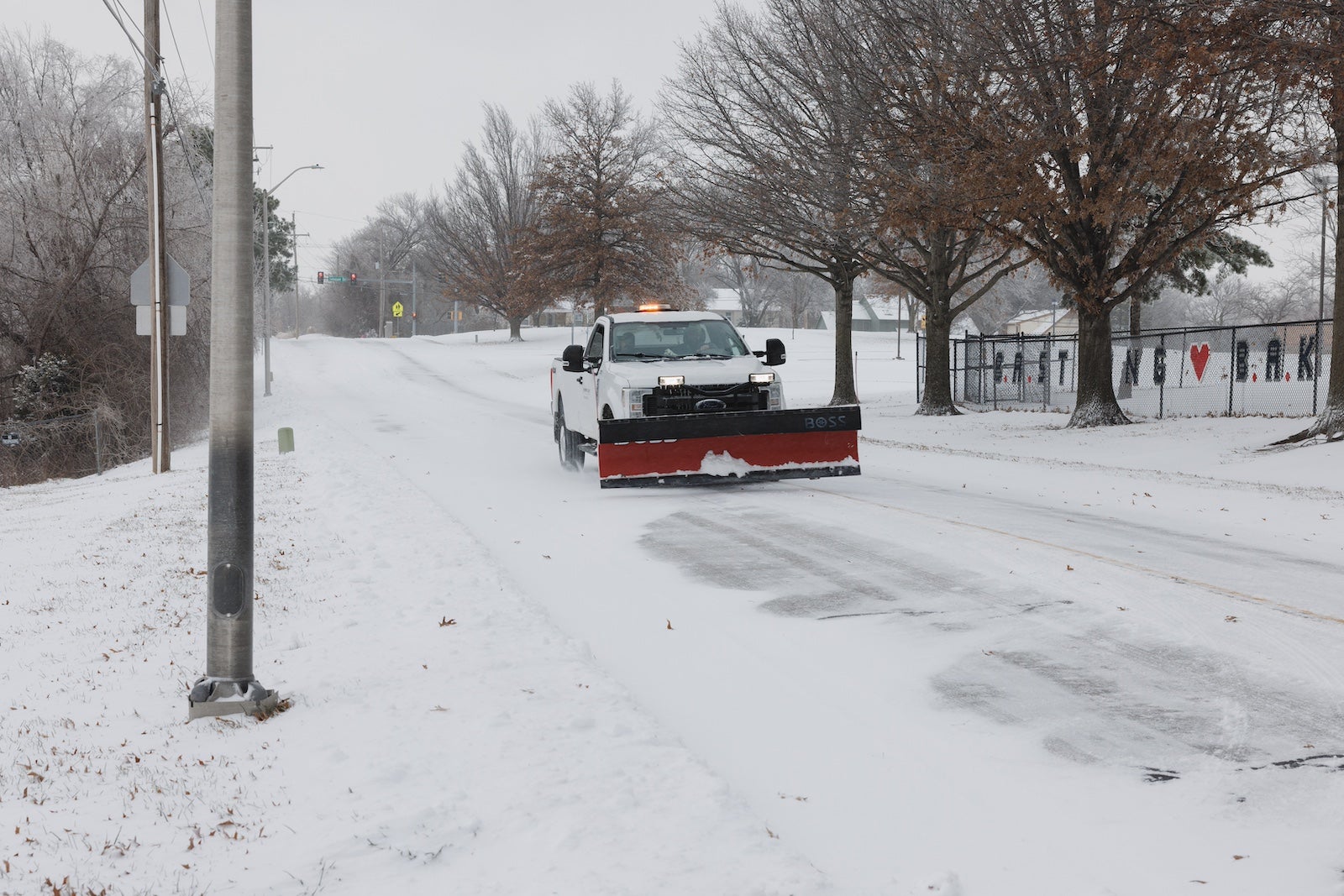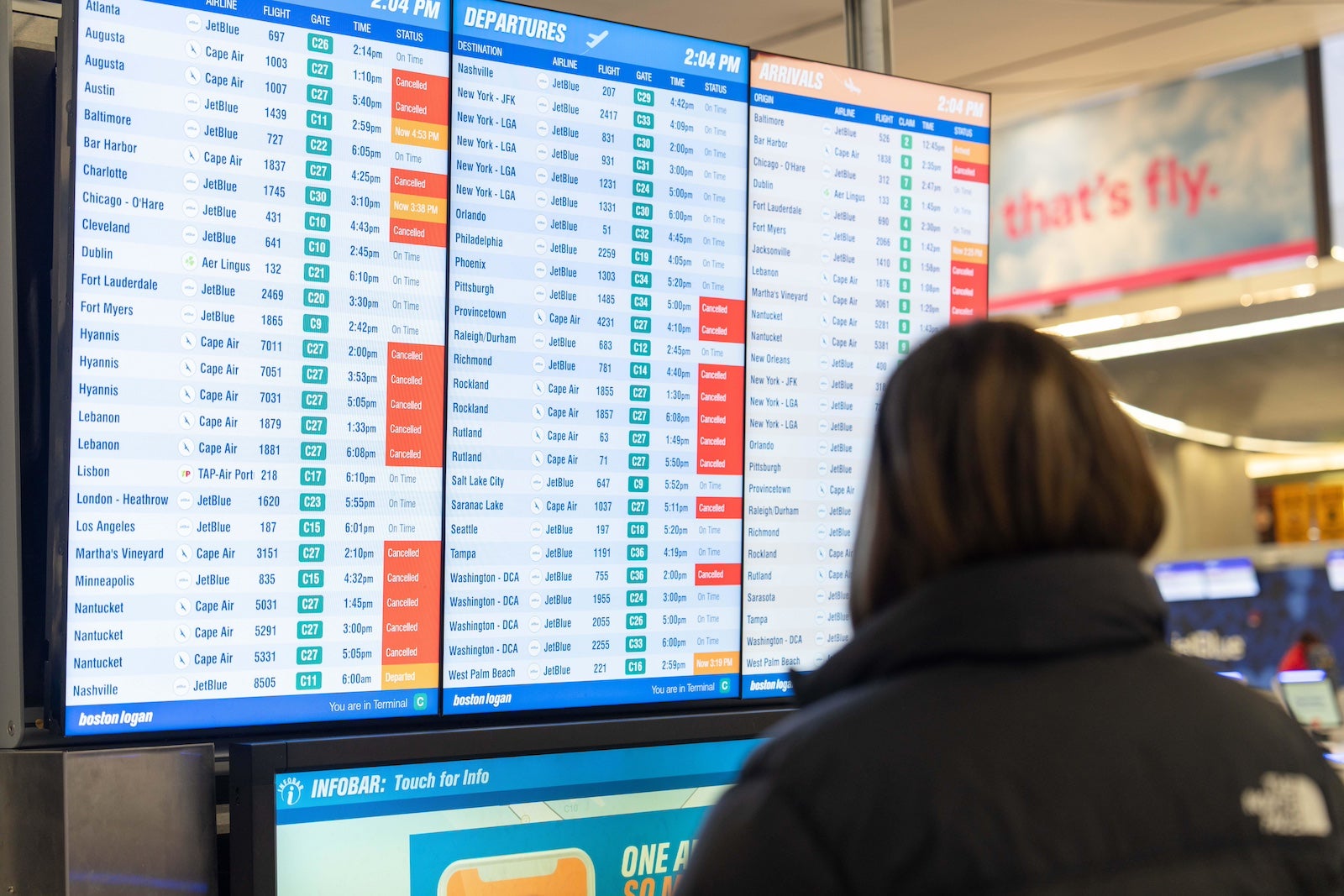The fiercest winter storm of the season is causing significant disruptions in air travel across a vast region of the country.
On Sunday, heavy snowfall, icy conditions, and frigid temperatures swept through much of the Midwest, leading to thousands of flight delays and cancellations. As the storm progresses toward the East Coast, the situation is expected to deteriorate further.
By 7:15 p.m. EST on Sunday, more than 1,500 flights had been canceled nationwide, according to FlightAware. In addition, around 6,700 flights reported delays.
Kansas City International Airport (MCI) in Missouri has been particularly hard-hit, experiencing close to 95% of its flights canceled on Sunday due to blizzard-like conditions.
The extensive cancellations came just a day after the airport had to temporarily close its runways due to rapid ice accumulation, which threatened the Kansas City Chiefs’ scheduled departure for their game in Denver.
Forecasters had warned for days about potential travel disruptions as the winter storm developed last week, with the National Weather Service indicating significant snowfall could occur from the Midwest all the way to Washington, D.C.
“Accumulating snow, possibly surpassing half a foot, could halt travel in areas like Kansas City, St. Louis, Indianapolis, and Cincinnati,” said AccuWeather Meteorologist Brandon Buckingham on Friday. He also highlighted that mid-Atlantic states would face “major travel risks from Sunday night through Monday evening.”
On Friday, Ronald Reagan Washington National Airport (DCA) announced that its snow team would be closely monitoring conditions and preparing to deploy snow removal equipment as needed.
Similarly, Philadelphia International Airport (PHL) cautioned travelers about the hazardous conditions expected into Monday morning.

Daily Newsletter
Enhance your inbox with the Flying Frugal Daily newsletter
Join over 700,000 readers for breaking news, in-depth guides, and exclusive deals from Flying Frugal’s specialists.
Most major U.S. airlines have issued travel alerts that provide passengers with added flexibility to adjust their itineraries in light of the adverse weather. This includes waiving change fees, even for those flying on the most restrictive fare types.
Southwest Airlines faced significant impacts on Sunday, leading all U.S. airlines with over 380 cancellations, representing about 8% of its schedule. The Dallas-based airline has a major presence in both Kansas City and St. Louis, as well as in the D.C. area, which is set to experience the worst of the storm shortly.
American Airlines has also canceled more than 175 flights on Sunday, affected by both the winter storm and multiple ground stops caused by high winds at its Dallas Fort Worth International Airport (DFW) base, according to the Federal Aviation Administration.
This winter storm has brought a tumultuous end to the holiday travel season, which already faced several challenges — from a tech glitch at American Airlines on Christmas Eve to severe thunderstorms in Texas during the Christmas week.
For travelers in the coming days, here’s what you need to know:
Stay informed about travel advisories
Check your airline’s website for any travel advisories that may apply to your flight. This could allow for easier changes to your itinerary directly through the airline’s app, even if you have a typically restrictive ticket, like basic economy.
American Airlines, for example, has an advisory in effect for dozens of airports across a significant portion of the country, including its hubs in Philadelphia and DCA.
United Airlines has issued advisories for nearly a dozen airports, including its hub in Washington Dulles International Airport (IAD). Southwest’s travel alert encompasses multiple cities where it has a strong presence, including Kansas City, St. Louis, Nashville, and Baltimore/Washington International Thurgood Marshall Airport (BWI).
Links to travel advisories for the four largest U.S. carriers:
Several airlines also issued travel advisories earlier this week following the Jan. 1 terrorist attack in New Orleans.
See a good rebooking option? Act quickly
If you encounter flight delays and spot a decent rebooking option in your airline’s app, don’t hesitate to secure it immediately!
With thousands of flights affected by the storm, many passengers are competing for available seats on flights that are still scheduled to depart. Those open seats can be booked quickly.
Read more: What to do if your flight is canceled or delayed
Staying home? You may be eligible for a refund
If your flight is canceled or significantly delayed and you decide to stay home instead, you should be entitled to a refund.
According to U.S. Department of Transportation regulations, airlines must refund passengers for the unused portion of their ticket when a flight is canceled or significantly delayed — but this only applies if the passenger opts not to travel rather than accepting rebooking.
Easy cancellation and miles back on award bookings
If the severe weather has you reconsidering your plans, there’s good news if you booked your trip using frequent flyer miles.
Most U.S. airlines generally allow you to cancel award bookings without incurring any fees, and you’ll also receive a refund for any taxes and fees associated with the booking.
Utilize airline lounge customer service
Are you stuck at the airport? If you’re a member of an airline lounge, remember that there are usually customer service agents available to assist you with rebooking. You might experience shorter wait times compared to the main airport concourse.
Keep in mind, however, this applies only to lounges affiliated with the airline you’re traveling on, not to lounges linked to credit card benefits.
Read more: 5 tips to ensure you have lounge access before your next flight
Seeking compensation for a delayed flight
Airlines have made various commitments to the Department of Transportation regarding meal vouchers, hotel accommodations, and other guarantees for flight cancellations and significant delays. However, these typically cover “controllable” disruptions, such as maintenance or staffing issues, and usually do not apply during adverse weather conditions.
This is where having a travel credit card with protection features can be useful, enabling you to recover unexpected expenses if you get stranded due to flight issues. Just remember, you usually need to book your trip with the card to qualify for claims.
Related reading:
















